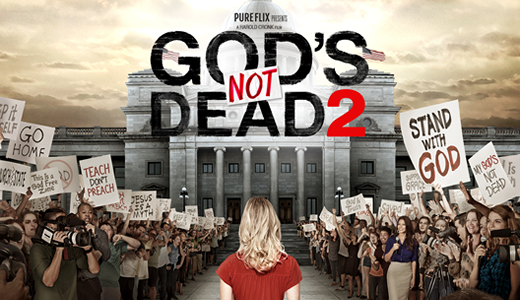Many, if not most, Christian filmmakers long to reach out to those beyond the faithful fold with their films. It’s a laudable goal. And a biblical one.
I’m sure that most of those earnest Christian directors could tell stories about how their movies have impacted viewers, likely leading some to embrace Jesus for the first time. That said, the gulf between faith-filled moviemakers and mainstream secular culture remains a daunting one. I was reminded of that this week when I came across this article by MTV’s Rachel Handler: “What Does Christian Netflix Want From Us?” Handler watched some of Pure Flix’s most popular films from the last few years, including I’m Not Ashamed, God’s Not Dead 2, I Am … Gabriel and Alison’s Choice. She then identified each film’s “Moral Lessons Imparted” and asked the question, “Am I Pure Yet?”
Handler’s sarcastic tone (“Pure Flix is just like Netflix,” she writes, “but for ‘families of faith,’ specifically the faith that sees earthly life as a filthy pit stop on the way to heaven, populated by millions of feckless, hell-bound sinners in need of salvation.”) is painful. But it also illustrates how big a challenge it is for a Christian film to connect with non-Christian viewers.
Others, however, have questioned the entire paradigm. Producer Mark Joseph (The Vessel, I Am David, Ray) recently told Fox News that that he thinks the term “faith-based film” needs to be put out to pasture. “The term scares away both the marginally religious and the irreligious, and it’s a signal to them that the story is going to be preachy and overbearing.”
Another Christian filmmaker, Spencer T. Folmar, thinks a better approach is to quit sanitizing movies to the point that they seem unrealistic. This director of Generational Sins, which deals with child abuse and alcoholism, told The Hollywood Reporter, “We live in an R-rated world, and covering up the darkness won’t bring it into the light.” Accordingly, his forthcoming, likely R-rated film is, according to the article, “overflowing with profanity.” Executive producer Thurman Mason adds, “People will call it ‘faith-based’ and we can’t help that, but we’re marketing it to secular audiences. We’re creating a new genre, and there could definitely be pushback.”
There were also developments this week on a couple of fronts regarding services that censor content from mainstream secular films. Utah-based movie-filtering service VidAngel—which has been engaged in an ongoing legal battle with Disney, 20th Century Fox and Warner Bros.—announced a new partnership that will allow subscribers to view cleaned-up content on Netflix, Amazon and HBO Go.
Almost simultaneously, Sony Entertainment launched “The Clean Version” initiative, which will scrub the studios films (either through editing or removing altogether) of “graphic violence, offensive language, sexual innuendo and other adult content,” according to Salon. The service would essentially give customers the opportunity to watch films that likely would eventually be edited for television or airline use anyway.
Some in the industry, however, say even studios don’t have the right to offer such edited versions apart from directors’ approval. The Director’s Guild of America told The Hollywood Reporter, “Directors have the right to edit their feature films for every non-theatrical platform, plain and simple. Taking a director’s edit for one platform and then releasing it on another — without giving the director the opportunity to edit—violates our agreement. As creators of their films, directors often dedicate years of hard work to realize their full vision, and they rightfully have a vested interest in protecting that work. We are committed to vigorously defending against the unauthorized alteration of films.”
Wonder Woman, meanwhile, has garnered the lion’s share of superhero headlines over the last two weeks. (Including a story this week revealing that actress Gal Gadot was five months pregnant when she shot some retakes for the blockbuster film.) That wall-to-wall wondrous coverage was interrupted this week by the sad news that Adam West, the man behind the cowl in the iconic Batman TV series of the 1960s, had passed away at the age of 88.
Elsewhere in the news, allegations of sexual abuse surfaced on the set of ABC’s reality show Bachelor in Paradise, prompting Warner Bros. to immediately cease production of it. Writing for The New York Times, Jennifer Weiner suggests that viewers’ appetites for ever-more lurid content on this (and similar) shows is a contributing factor in what has allegedly occurred. She writes, “As the reality genre has flourished, viewers’ appetites have increased. We like to watch. We always want more drama, more sex, more fights, more tears—and producers have been happy to provide it.” She says the shocking thing isn’t that an purported assault like this happened, “but that it has taken this long for something this bad to occur.”
Finally this week, HBO’s Sesame Street has a new skit riffing on the explicit Netflix series Orange is the New Black dubbed “Orange Is the New Snack.” Orange’s creator, Jenji Kohan, said in an interview that her next project is a drama about Jesus’ teen years. “Like The Wonder Years but with Jesus,” she said.






Recent Comments